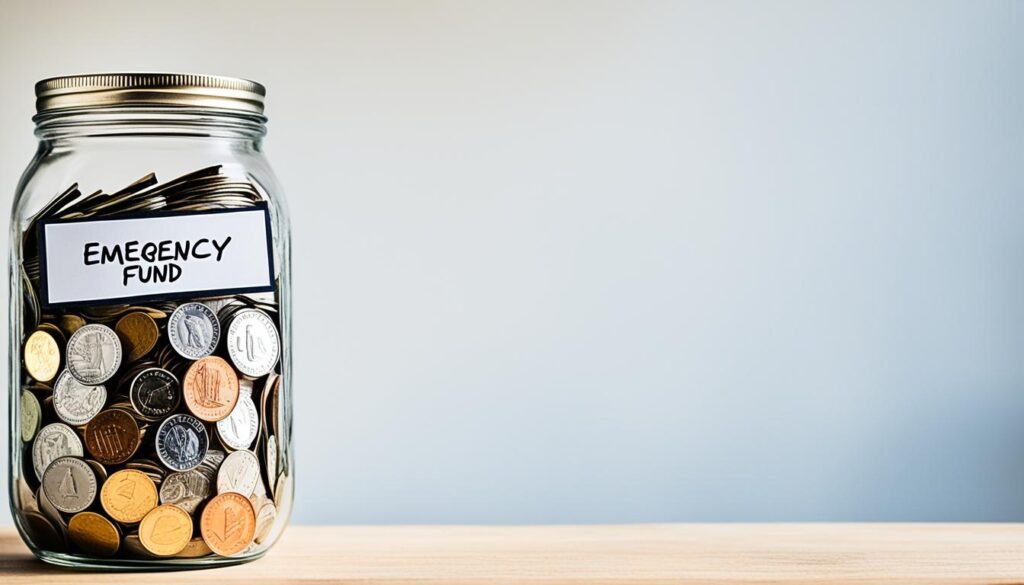Did you know that about 20% of Americans are currently living paycheck to paycheck, highlighting the critical need for financial planning and an emergency fund in today’s unpredictable economy1? As individuals grapple with the decision of whether to prioritize student loans or build an emergency fund, understanding the significance of personal finance becomes imperative. Balancing debt repayment while establishing savings can feel daunting, yet making informed choices based on individual circumstances can pave the way to better financial health2. This article explores the dilemma many face: should I pay off student loans or build an emergency fund? We will delve into the importance of having a solid financial foundation, especially in times of unexpected expenses, which can lead to high-interest debt if not addressed appropriately1. Ultimately, the right choice can significantly impact your financial future.
Key Takeaways
- 20% of Americans live paycheck to paycheck, stressing the need for an emergency fund.
- The decision between student loans and an emergency fund requires careful consideration.
- Personal finance knowledge is vital for financial planning and stability.
- Unexpected expenses can lead to high-interest debt without an emergency fund.
- Making informed financial choices affects long-term stability.
Understanding the Financial Dilemma
Personal finance involves managing one’s money effectively to reach financial goals while making informed decisions. Understanding its principles is crucial for successful financial decision-making. Many individuals face challenges in navigating their financial landscape. Striking a balance between paying off debt and saving for emergencies often complicates their choices.
The Importance of Personal Finance
Emphasizing personal finance improves one’s ability to handle unexpected disruptions. Almost half of families lack sufficient funds to cover a $400 emergency, highlighting the dire need for preparedness3. Establishing a solid foundation in financial literacy enables individuals to tackle various financial dilemmas more confidently.
Impact of Emergency Expenses on Debt Management
Emergency expenses can drastically affect debt management strategies. Over 50% of families struggle with the choice of prioritizing debt repayment versus saving for future needs3. Without adequate savings, crisis situations may force individuals to rely on high-interest loans, exacerbating their financial burdens. Financial experts like Dave Ramsey suggest maintaining a minimum emergency fund of $1,000 as a buffer before aggressively addressing debt3.

When to Prioritize Your Emergency Fund
Establishing an emergency fund is crucial in achieving financial stability, particularly when unforeseen circumstances arise. A solid emergency fund can protect against the need to incur high-interest credit card debt during emergencies. Ideally, this fund should equal 3-6 months’ worth of expenses to provide adequate support for unexpected situations4. Without this financial cushion, many individuals find themselves turning to high-interest credit options, which can exacerbate their financial burden.
Lack of an Existing Emergency Fund
Many individuals experience financial stress when they lack an emergency fund. In fact, over 43 percent of U.S. adults with credit card balances report that emergency expenses contribute to their growing debt each month5. Without savings, individuals may end up accumulating debt and facing financial instability. Studies indicate that 36% of people with credit card debt have amounts that exceed their emergency savings5.
Dealing with ‘Good’ Debt
Understanding the difference between good debt and bad debt is essential. Good debt often includes loans taken out to invest in appreciating assets, such as student loans. While it is important to manage these debts responsibly, prioritizing an emergency fund is equally essential. This financial cushion can ensure that unexpected expenses do not derail your ability to manage good debt effectively.
Avoiding New Debt for Future Expenses
Aiming for financial stability means actively avoiding new debt whenever possible. Relying on an emergency fund allows individuals to navigate unexpected expenses without the need for high-interest credit options. Statistics reveal that 89% of adults believe they would need enough savings to cover three months of expenses to feel comfortable5. Setting aside funds regularly through automatic transfers from paychecks can help achieve this savings goal efficiently.

When Paying Off Student Loans Should Be the Priority
For many individuals, the decision to prioritize student loan repayment comes from urgent financial obligations that must be met. Immediate obligations to repay debts, such as mortgages or auto loans, should never be overlooked. These responsibilities demand consistent payments to ensure that one’s financial stability and creditworthiness are maintained. Neglecting these payments can lead to damaging consequences for your financial future.
Immediate Obligations to Repay Debt
Failing to address high-interest debt, particularly credit card debt, can create a mountain of financial strain. The interest on such debts often accumulates quickly, further complicating one’s financial obligations. Student loan repayment is crucial in this context, as missed payments can lead to repercussions affecting one’s credit score. It’s essential to stay current on these payments to maintain positive credit history, which plays a significant role in future financial opportunities6.
Struggling with High-Interest Debt
Prioritizing student loan repayment is especially vital when there is high-interest debt involved. Paying off student loans promptly can alleviate pressure from other high-interest financial obligations. By focusing on lowering high-interest debt, individuals can create a clearer pathway to manage their financial responsibilities. Notably, the tax-deductibility of student loan interest can provide a financial incentive to expedite repayment7.
Improving Your Credit Score
Improving your credit score can be directly influenced by how effectively you manage student loans. Consistent payments showcase responsible financial behavior, positively affecting your creditworthiness. A stronger credit score opens doors for better interest rates on future loans, ultimately saving money over time. For those maintaining good payment routines, the advantage of student loan repayment as a major factor in credit score improvement cannot be overstated8.
Should I Pay Off Student Loans or Build an Emergency Fund?
Deciding between paying off student loans and building an emergency fund can be a complex choice influenced by your current financial situation. Evaluating your debt level, income, and overall financial objectives is crucial in making this decision. A mixture of both debt repayment and savings can often yield greater stability in your finances.
Evaluating Your Current Financial Situation
Understanding your current financial situation is the first step in this evaluation. A significant number of U.S. adults, approximately 36 percent, have more credit card debt than they do in emergency savings9. Furthermore, data shows that 30% of adults cannot cover three months of expenses through any means10. This indicates a need for emergency savings that must be prioritized before aggressive debt repayment strategies. If you have manageable debt levels, it may be worthwhile to start saving for other financial goals as well.
Benefits of Balancing Debt Repayment and Savings
Balancing debt repayment with the development of emergency savings addresses two critical areas of financial health. Maintaining a high-yield savings account with three to six months’ worth of expenses is crucial when aiming to pay off student loans early9. When emergency savings are established, individuals can avoid falling into debt traps, especially since the average credit card interest rate is above 20 percent, considerably higher than most student loans9. By consolidating debt, consumers can often reduce their overall expenses and lower stress levels, as indicated by 88% of customers who did so through personal loans10.
| Aspect | Paying Off Student Loans | Building Emergency Savings |
|---|---|---|
| Pros | Lower overall interest payments and improved credit score | Financial security during unexpected events |
| Cons | Potential neglect of immediate financial crises | Slower repayment of existing debts |
| Ideal Scenario | Stable income with manageable debt levels | Debt consolidation or low-interest loans in place |
Balancing debt repayment while building emergency savings can strengthen your overall financial foundation, creating a more resilient financial future9.
Building an Emergency Fund: Steps and Strategies
Establishing an emergency fund is a crucial step towards financial security. By implementing effective strategies like budgeting, setting a savings goal, and choosing the right savings account, individuals can create a stable financial foundation. The following sections will detail the essential steps for building an emergency fund.
Creating a Budget
Budgeting plays a key role in building an emergency fund. Understanding your income and expenses allows you to allocate resources effectively11. A recommended practice is to save around 20% of your income, while dividing the remainder into essential needs and discretionary wants. This meticulous approach to budgeting not only identifies potential savings but also helps in recognizing areas where spending can be reduced.
Setting a Realistic Savings Goal
Having a specific savings goal dynamic helps maintain motivation11. For instance, determining how much money you wish to save in an emergency fund within a given timeframe enables a focused strategy. Regular tracking of progress, coupled with celebrating milestones, can reinforce this savings habit11. Research indicates that many Americans feel uncomfortable with their emergency savings level, making a solid savings goal even more critical12.
Choosing the Right Savings Account
Selecting the right savings account is essential for optimal growth and liquidity of your emergency fund. High-yield savings accounts typically offer better interest rates compared to standard accounts, enhancing the growth potential of your savings11. Automated transfers can simplify the saving process, making it easier for individuals with steady income to contribute consistently towards their fund11. This option resonates well with the trend of many Americans utilizing direct deposit for their paychecks12.
| Step | Description | Benefits |
|---|---|---|
| Budgeting | Analyze income and expenses to allocate savings. | Identifies potential savings; reduces unnecessary spending. |
| Savings Goal | Set a specific amount to save within a time frame. | Motivates consistent saving; tracks progress towards goals. |
| Savings Account | Choose a high-yield savings account for better interest. | Maximizes growth potential; facilitates automated saving. |
By following these steps and maintaining an organized approach, individuals can significantly improve their capacity for building an emergency fund, thus enhancing their overall financial wellbeing.
Debt Management Techniques: How to Pay Down Debt Fast
Managing debt effectively can significantly enhance financial management and overall stability. Utilizing different debt repayment techniques can lead to accelerated payoff and improved financial health. Two prominent methods include the snowball method and debt consolidation, each offering unique strategies to reduce debt burden.
The Snowball Method for Debt Repayment
The snowball method focuses on paying off the smallest debts first, providing a series of quick wins that foster motivation13. This psychological benefit is essential for many in their debt repayment journey14. Not only does it help in reducing the number of debts owed, but it also cultivates a sense of accomplishment as each debt is paid off.
Consideration of Debt Consolidation
Debt consolidation simplifies payments by combining multiple outstanding balances into one new debt. This method often results in a single monthly payment, which makes it easier to manage finances14. Additionally, consolidating high-interest debts can enable borrowers to secure lower interest rates, consequently freeing up funds for savings or further debt repayment15. Regularly reviewing credit reports can help track progress in managing debt and ensure that credit scores improve over time.
| Debt Repayment Technique | Description | Benefits |
|---|---|---|
| Snowball Method | Pay off the smallest debts first for rapid success. | Improved motivation and quicker debt reduction. |
| Debt Consolidation | Merge multiple debts into a single loan. | Streamlined management and potential lower interest rates. |
Both techniques can effectively contribute to a structured approach in managing debts, allowing individuals to regain control over their financial situation13.
Potential Risks of Using Emergency Funds to Pay Off Debt
Dipping into emergency funds to alleviate debt may present significant risks of using emergency funds, affecting one’s overall financial strategy. While it might provide immediate relief, depleting savings compromises financial sustainability, leaving individuals vulnerable to future unforeseen expenses. This can trap them in a cycle of debt, wherein they may struggle to recover financially after a sudden necessity arises.
Assessing the Sustainability of Dipping into Savings
Many individuals overlook the crucial balance between debt repayment and maintaining a robust emergency fund. Research indicates that 58% of respondents felt hindered by debt from achieving major financial milestones, such as home buying or starting a family16. Financial advisors generally recommend having an emergency fund sufficient to cover three to six months’ worth of living expenses17. This financial cushion can provide essential protection against unexpected expenses like medical emergencies or auto repairs.
Long-term Consequences on Financial Security
The long-term consequences on financial security cannot be overstated. A startling 36% of people delayed making significant purchases due to ongoing debt, implying that the inability to act on life’s milestones exacerbates stress and uncertainty16. Without a solid savings foundation, the risk of accumulating more debt increases, especially when faced with unavoidable expenses. The average credit card interest rate sits at 24.61%, indicating that relying on credit may lead to further financial instability18. As individuals weigh their options, it remains critical to consider both the immediate relief of using emergency funds and the enduring costs of diminished financial security.
Conclusion
In summary, making informed financial decision-making regarding whether to build an emergency fund or pay off student loans is crucial for achieving long-term financial stability. Individuals must assess their unique circumstances to find a suitable balance between savings and debt management, recognizing that personal finance priorities shift based on individual situations.
Cultivating a strong emergency fund, ideally covering 6-12 months of living expenses, creates a safety net that can help mitigate life’s uncertainties while also reducing the pressure on repaying student loans, which typically have lower interest rates than most forms of debt19. Moreover, employing budgeting strategies such as the 50/30/20 rule can facilitate a clearer pathway to managing both obligations effectively20.
Ultimately, prioritizing finances through thoughtful planning not only strengthens financial health but also empowers individuals to make sustainable choices that positively impact both debt repayment and overall savings goals21.
FAQ
Should I pay off my student loans or build an emergency fund first?
What is the risk of not having an emergency fund?
How do I determine if my student loans are ‘good’ debt?
What should I do if I have high-interest consumer debt and student loans?
What are some practical steps to build an emergency fund?
How can using an emergency fund to pay down debt affect my finances?
What is the snowball method in debt repayment?
Why is financial literacy important in debt management?
Source Links
- https://www.lendingtree.com/debt-consolidation/emergency-fund-or-pay-off-debt/
- https://www.salliemae.com/blog/pay-off-debt-and-start-emergency-fund/
- https://eringobler.com/pay-off-debt-or-save-money/
- https://www.citizensbank.com/learning/build-an-emergency-fund-while-paying-down-student-loans.aspx
- https://www.bankrate.com/banking/savings/these-guidelines-will-help-you-decide-whether-to-pay-down-debt-or-save/
- https://www.schwab.com/learn/story/should-you-save-retirement-or-pay-off-student-loans
- https://www.investopedia.com/personal-finance/save-down-payment-or-pay-student-loans/
- https://www.nerdwallet.com/article/loans/student-loans/save-invest-pay-off-student-loans
- https://www.bankrate.com/loans/student-loans/pay-more-than-minimum-payment/
- https://www.discover.com/personal-loans/resources/consolidate-debt/successfully-payoff-debt-build-emergency-fund/
- https://www.consumerfinance.gov/an-essential-guide-to-building-an-emergency-fund/
- https://www.bankrate.com/banking/savings/starting-an-emergency-fund/
- https://www.equifax.com/personal/education/debt-management/articles/-/learn/paying-off-debt-strategies/
- https://www.forbes.com/advisor/banking/saving-vs-paying-down-debt/
- https://www.cnbc.com/select/pay-off-credit-card-debt-or-save-for-emergency-fund/
- https://www.cnbc.com/select/when-to-use-emergency-fund-to-pay-off-debt/
- https://www.nerdwallet.com/article/banking/emergency-fund-why-it-matters
- https://www.fbfs.com/learning-center/invest-and-pay-debt
- https://www.laurelroad.com/refinance-student-loans/the-pros-and-cons-of-paying-off-student-loans-early/
- https://www.usccreditunion.org/learn/blog/student-loans-budget-your-way-to-freedom/
- https://www.experian.com/blogs/ask-experian/should-you-save-for-a-down-payment-or-pay-off-student-loans/

